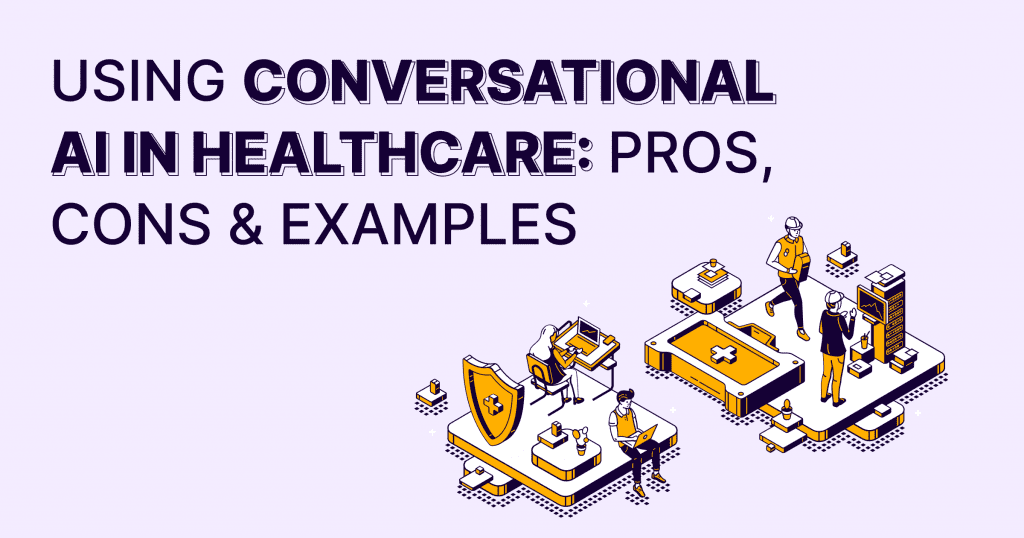The healthcare sector is undergoing a transformation, and conversational AI is at the forefront of this change. By integrating conversational AI technology into healthcare settings, providers can improve patient care, streamline operations, and enhance patient engagement like never before. From automating routine administrative tasks to offering personalized mental health support, conversational AI tools are reshaping how healthcare services are delivered.
Why Does This Matter?
Healthcare professionals and organizations are continually looking for innovative ways to improve patient outcomes and operational efficiency. Conversational AI systems offer the potential to revolutionize healthcare delivery, making it more patient-centric and efficient. These AI-driven solutions rely on natural language processing and machine learning to analyze patient data, automate scheduling appointments, and even assist with chronic disease management.
In this article, we’ll explore the pros, cons, and examples of conversational AI in healthcare. Whether you’re a healthcare provider, a customer service representative, or part of the healthcare management team, you’ll gain insights into how conversational AI systems can enhance patient interactions and modernize healthcare delivery.
What is Conversational AI?
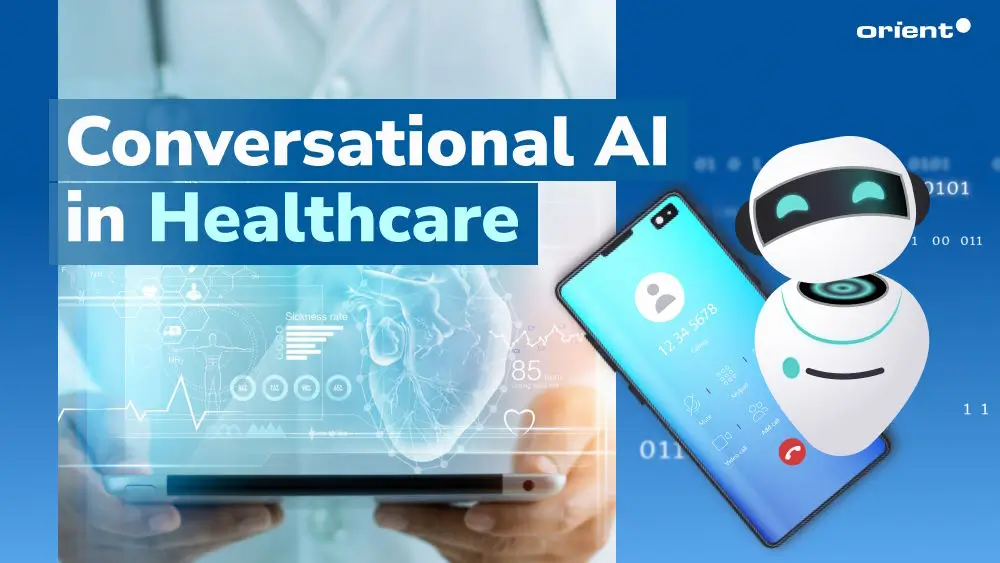
Conversational AI refers to systems powered by artificial intelligence that enable human-like interactions through text or voice. These systems use advanced technologies like natural language processing (NLP), machine learning, and natural language understanding to communicate, understand, and respond to users. In the healthcare sector, conversational AI tools have emerged as valuable assets for enhancing patient interactions and streamlining healthcare operations.
These tools aren’t just chatbots. Modern conversational AI systems go beyond responding to scripted inputs. They can analyze patient data, understand context, and provide solutions tailored to individual needs. For example, healthcare conversational AI solutions can guide patients through health system processes, help them schedule appointments, or offer medication reminders.
Why Healthcare Needs Conversational AI
Healthcare organizations are adopting conversational AI because it addresses several challenges within existing healthcare systems:
- Improving Patient Engagement: By offering 24/7 access to support and personalized health education, conversational AI helps patients stay informed and involved in their healthcare journey.
- Streamlining Administrative Tasks: Automating routine administrative tasks such as processing insurance claims or updating electronic health records reduces the burden on healthcare professionals.
- Enhancing Operational Efficiency: Integrating conversational AI into healthcare settings improves efficiency by managing repetitive tasks, such as triaging patient queries or assisting in disease diagnosis.
This technology is not only valuable for patient care but also revolutionizes healthcare delivery by improving communication between both healthcare professionals and patients.
Real-Life Applications
Some examples of conversational AI in healthcare include:
- Mental Health Support: Virtual assistants offering mental health services, such as guided therapy or crisis intervention.
- Chronic Disease Management: AI systems providing reminders for medications or follow-ups for chronic disease patients.
- Post-Treatment Care: Chatbots helping patients track recovery and access resources during post-treatment care.
As conversational AI technology becomes increasingly sophisticated, its role in healthcare will continue to expand. In the next section, we’ll dive into the specific benefits of conversational AI in healthcare.
Pros of Using Conversational AI in Healthcare
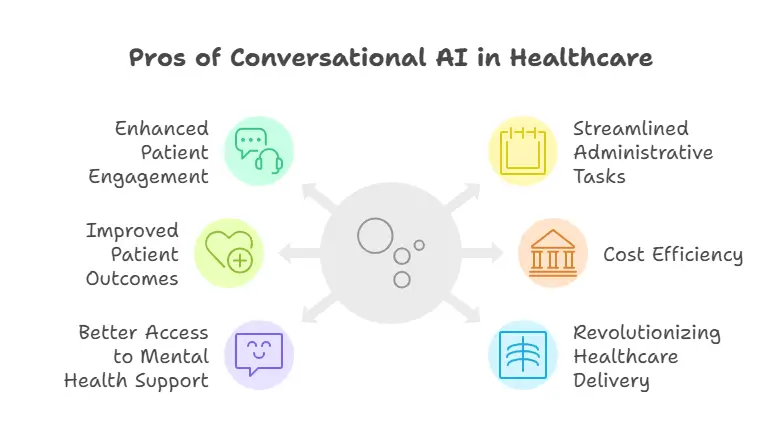
The adoption of conversational AI in healthcare settings is transforming how healthcare providers interact with patients and manage operations. By automating routine tasks and improving patient engagement, conversational AI tools offer numerous benefits for the healthcare industry.
1. Enhanced Patient Engagement
Conversational AI systems empower healthcare organizations to engage patients more effectively. Through personalized communication, these tools ensure patients receive tailored health education, medication reminders, and appointment notifications. For instance, AI-driven chatbots can enhance patient engagement by providing 24/7 support, ensuring patients remain informed throughout their healthcare journey.
- Example: Virtual assistants in healthcare facilities can answer common questions about symptoms, medications, or procedures, saving time for medical professionals while improving patient satisfaction.
2. Streamlined Administrative Tasks
Healthcare professionals often face a heavy workload due to repetitive administrative tasks. Conversational AI for healthcare automates processes like scheduling appointments, updating electronic health records, and managing insurance claims. This reduces the administrative burden and allows providers to focus more on patient care.
- Example: AI-powered systems integrated with existing healthcare systems can schedule appointments and send reminders to patients, reducing missed visits and enhancing operational efficiency.
3. Improved Patient Outcomes
By offering timely assistance and guidance, conversational AI systems help improve health outcomes. These systems analyze patient data to provide actionable insights, supporting healthcare professionals in making informed decisions. For chronic disease management, AI can monitor patients’ conditions and ensure timely interventions.
- Example: Patients managing diabetes or hypertension can benefit from AI tools that provide reminders for routine check-ups and prescriptions.
4. Cost Efficiency
Conversational AI solutions help healthcare organizations reduce operational costs by automating tasks that would otherwise require human intervention. This scalability makes it a valuable resource for healthcare providers looking to maximize efficiency without compromising patient care.
- Example: A single conversational AI tool can handle thousands of patient interactions simultaneously, minimizing the need for additional staff.
5. Better Access to Mental Health Support
One of the most impactful applications of conversational AI in healthcare is its use in mental health support. These systems provide a safe, anonymous environment for patients to discuss their concerns and access guided interventions.
- Example: AI-based mental health tools offer therapy sessions, mood tracking, and coping mechanisms, reducing barriers to seeking help.
6. Revolutionizing Healthcare Delivery
Integrating conversational AI into healthcare settings revolutionizes healthcare delivery by making it more patient-centric. These systems ensure patients receive immediate responses, improving their overall experience and satisfaction.
- Example: During emergencies, conversational AI tools can guide patients to the nearest healthcare facility or connect them with the appropriate service quickly.
Incorporating conversational AI technology into healthcare systems offers a host of benefits, from improving patient interactions to reducing administrative workloads. However, while the advantages are significant, it’s essential to understand the challenges involved. In the next section, we’ll examine the cons of using conversational AI in healthcare and how to address them effectively.
Cons of Using Conversational AI in Healthcare
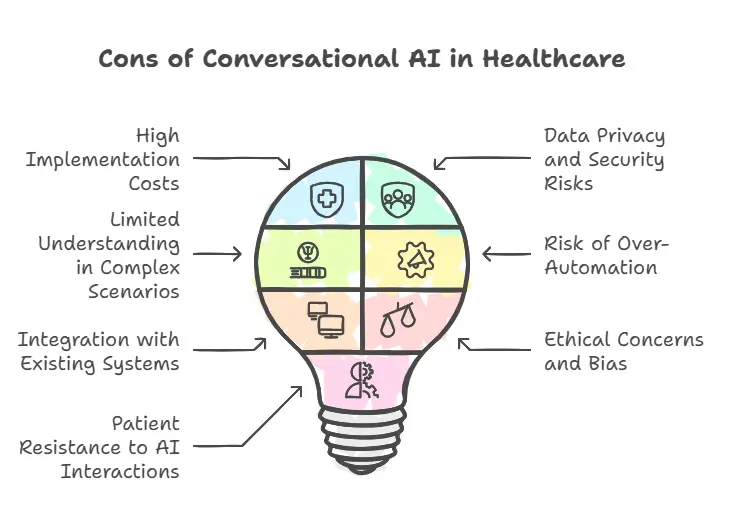
While conversational AI technology offers significant benefits, there are challenges that healthcare providers and organizations must address to fully leverage its potential. These challenges often stem from implementation hurdles, ethical concerns, and the need for seamless integration with existing healthcare systems.
1. High Implementation Costs
Deploying conversational AI in healthcare requires significant upfront investment. Building, training, and maintaining conversational AI systems, especially for complex healthcare environments, can strain the budgets of smaller healthcare facilities or providers.
- Challenge: Small to mid-sized healthcare organizations may struggle to afford the technology or resources needed for implementation.
- Solution: Cloud-based conversational AI solutions or SaaS models can help reduce costs and improve accessibility.
2. Data Privacy and Security Risks
Healthcare conversational AI systems often handle sensitive patient information, including health data and electronic health records. Any breach or misuse of this data can have severe consequences, both ethically and legally. Most organizations use a document management system to keep things in place.
- Challenge: Maintaining compliance with data protection laws like HIPAA or GDPR while ensuring the security of sensitive patient information.
- Solution: Implementing robust encryption protocols, access controls, and regular audits to secure patient data.
3. Limited Understanding in Complex Scenarios
Although conversational AI systems are advanced, they can struggle with handling complex or nuanced medical inquiries. A lack of proper responses may lead to frustration or misinformation for patients.
- Challenge: Conversational AI relies on trained datasets, which may not cover all possible scenarios in patient interactions.
- Solution: Combining AI systems with human intervention to manage queries that require medical expertise.
4. Risk of Over-Automation
Over-reliance on conversational AI for healthcare delivery could diminish the personal touch of patient care. Patients may feel undervalued when their concerns are solely addressed by automated systems.
- Challenge: Balancing automation with human interaction to maintain a patient-centric approach.
- Solution: Designing AI workflows that escalate complex issues to healthcare professionals when needed.
5. Integration with Existing Healthcare Systems
Integrating conversational AI into healthcare systems, such as electronic health records or legacy software, can be a challenging process. Compatibility issues may lead to inefficiencies or disruptions in healthcare delivery.
- Challenge: Ensuring seamless integration without disrupting existing healthcare operations.
- Solution: Partnering with technology providers that offer customizable and interoperable AI solutions.
6. Ethical Concerns and Bias
Conversational AI technology may inadvertently introduce biases into patient interactions, particularly if the training data is not diverse or representative. Ethical concerns about AI decision-making can also arise when dealing with critical health outcomes.
- Challenge: Avoiding biases and ensuring AI recommendations are fair and inclusive.
- Solution: Regularly auditing conversational AI systems and updating training data to reflect diverse patient demographics and needs.
7. Patient Resistance to AI-Based Interactions
Some patients may prefer direct communication with healthcare professionals over interacting with conversational AI tools. This resistance can limit the adoption of AI-driven healthcare solutions.
- Challenge: Building trust in conversational AI systems among patients.
- Solution: Educating patients about the benefits of conversational AI and ensuring human oversight for sensitive situations.
While these challenges are significant, they are not insurmountable. By addressing these issues thoughtfully, healthcare organizations can maximize the potential of conversational AI while maintaining high standards of patient care. In the next section, we’ll explore real-world examples of conversational AI in healthcare to understand how these systems are making an impact.
Real-World Examples of Conversational AI in Healthcare
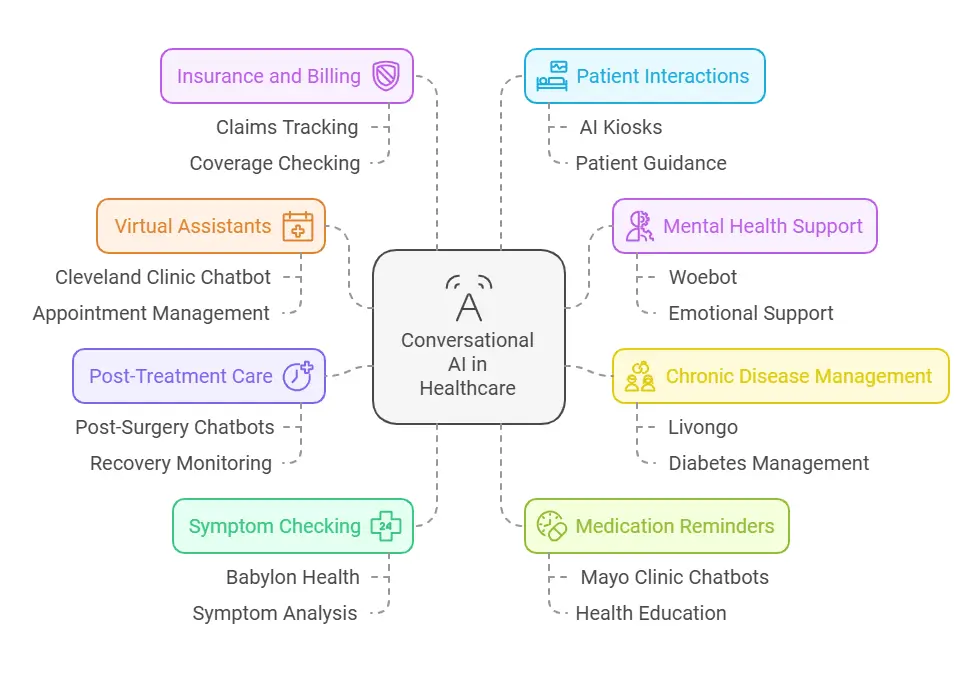
Conversational AI systems are already making a significant impact in healthcare settings. These real-world applications demonstrate how conversational AI technology is revolutionizing patient care, operational efficiency, and healthcare delivery.
1. Virtual Assistants for Scheduling Appointments
Many healthcare organizations use conversational AI tools to streamline appointment scheduling. These systems allow patients to book, reschedule, or cancel appointments without waiting on hold or interacting with human staff.
- Example: Cleveland Clinic implemented an AI-based chatbot that integrates with their existing healthcare systems, enabling patients to schedule appointments seamlessly. This system reduces administrative workload and enhances patient satisfaction.
2. Mental Health Support Services
Conversational AI has become a critical resource in providing mental health support. AI chatbots offer anonymous and accessible support, especially for individuals who may hesitate to seek traditional therapy.
- Example: Woebot, an AI-driven mental health assistant, uses natural language understanding to provide emotional support, guided interventions, and mood tracking. It’s widely used for mental health education and crisis management.
3. Chronic Disease Management
AI-powered systems play a crucial role in managing chronic diseases. Conversational AI tools monitor patient conditions, provide medication reminders, and offer guidance on lifestyle changes to improve health outcomes.
- Example: Livongo uses conversational AI to assist diabetes patients. The tool analyzes patient data, sends personalized recommendations, and improves patient engagement in managing their condition.
4. Post-Treatment Care and Follow-Up
After hospital discharge, patients often need guidance during their recovery journey. Conversational AI solutions provide post-treatment care instructions, answer patient queries, and monitor recovery progress.
- Example: Hospitals are deploying chatbots to follow up with patients post-surgery, ensuring they adhere to treatment plans and report any complications.
5. AI Chatbots for Symptom Checking
Symptom checker chatbots guide patients to appropriate care by analyzing their symptoms and recommending next steps. These tools improve healthcare efficiency by reducing unnecessary clinic visits and easing the burden on emergency services.
- Example: Babylon Health developed an AI chatbot that evaluates patient symptoms using machine learning. It provides suggestions for care, including when to visit a doctor or self-manage symptoms.
6. Medication Reminders and Health Education
Conversational AI systems ensure patients adhere to their treatment plans through timely reminders and educational content.
- Example: The Mayo Clinic uses AI chatbots to provide medication reminders and educate patients about managing conditions like hypertension and asthma.
7. Assisting with Insurance Claims and Billing
AI systems simplify the complex process of handling insurance claims and medical billing. This reduces administrative delays and improves the overall patient experience.
- Example: Conversational AI tools integrated into healthcare operations allow patients to check insurance coverage, submit claims, and track the status of their reimbursements.
8. Improving Patient Interactions in Healthcare Facilities
Hospitals use conversational AI solutions to provide patients with directions, FAQs, and wait time updates. This enhances the overall patient experience during visits.
- Example: AI kiosks in hospitals offer instant support, guiding patients to the correct department or answering questions about their appointments.
These examples highlight how conversational AI for healthcare is reshaping patient interactions and improving operational efficiency across the healthcare industry. The versatility of conversational AI systems makes them applicable to various healthcare settings, from mental health support to chronic disease management.
Conclusion
Conversational AI is reshaping healthcare by enhancing patient engagement, streamlining operations, and improving healthcare delivery. Its applications, from automating routine tasks to providing mental health support, highlight its potential across industries. For SaaS companies, SMBs, and customer support teams, healthcare’s adoption of conversational AI offers lessons in efficiency, personalization, and data-driven decision-making.
While challenges like data privacy, integration, and ethical concerns exist, they can be addressed with proper planning and thoughtful implementation. Conversational AI stands as a transformative technology capable of improving outcomes in healthcare and beyond.
FAQ Section: Conversational AI in Healthcare
Here’s a set of frequently asked questions to address common queries related to conversational AI in healthcare and beyond:
1. What is conversational AI, and how does it work in healthcare?
Conversational AI uses technologies like natural language processing (NLP) and machine learning to simulate human-like interactions through chatbots or virtual assistants. In healthcare, it assists with tasks like scheduling appointments, answering patient queries, providing medication reminders, and supporting chronic disease management.
2. How does conversational AI improve patient engagement?
Conversational AI enhances patient engagement by offering 24/7 support, personalized health education, and automated follow-ups. These systems keep patients informed and involved in their healthcare journey, improving satisfaction and outcomes.
3. Can conversational AI handle sensitive patient information securely?
Yes, but only when implemented with strict data protection measures. Healthcare providers must ensure compliance with regulations like HIPAA or GDPR by using encrypted data storage, secure access controls, and regular audits.
4. Are there affordable conversational AI tools for SMBs?
Yes, many SaaS-based conversational AI solutions, such as Chatfuel, Tars, and ManyChat, offer scalable and budget-friendly options for small businesses. These tools are designed to automate tasks while maintaining a cost-effective approach.
